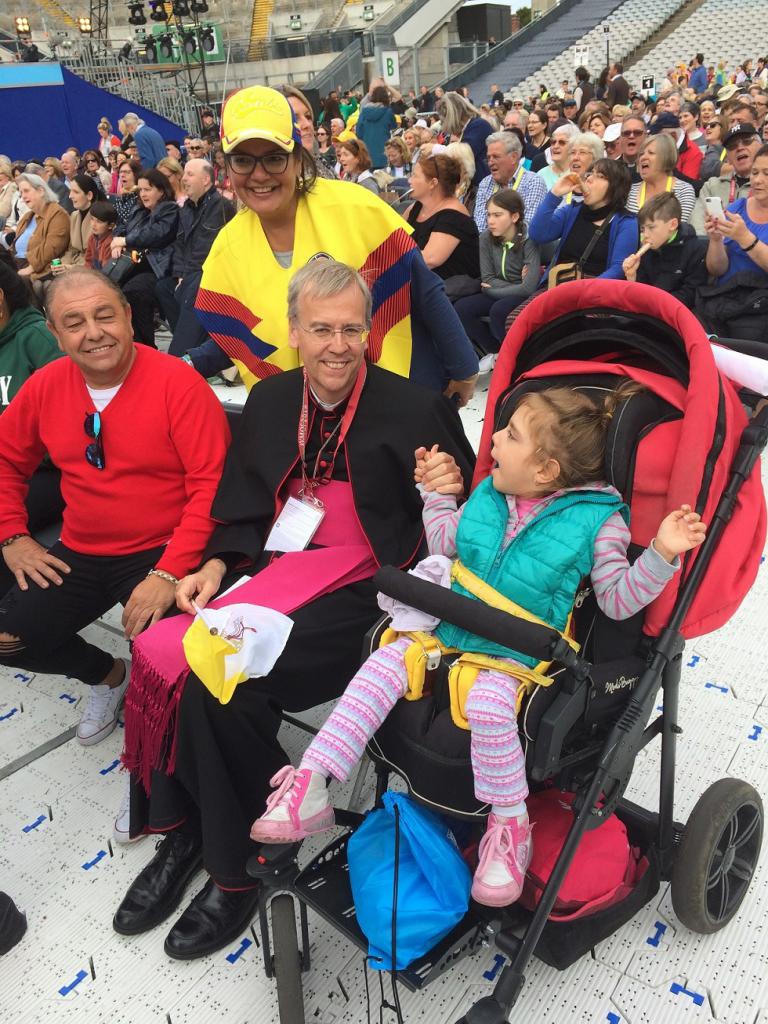by Bishop Nicholas Hudson
‘The joy of love experienced by families is also the joy of the Church.’ So begins Amoris Laetitia. These are heart-warming words which seemed to find deeply eloquent expression in the World Meeting of Families in Dublin. It felt like three days of the best possible in-service in the Church’s vision of marriage and family life. Joy indeed underpinned the whole event, a joy which climaxed in the Pope’s arrival for the Festival of Families, a marvellous celebration of dance, music and, most powerful of all, the testimony of one family after another to the joy of love experienced in their Catholic families. It was also a marvellous antidote to the pain experienced by all Catholics this summer at continued revelations of abuse by clergy and others of the very gift of sexuality.
One particularly powerful antidote came in the exposition by Cardinal Maradiaga on the ‘Revolution of Tenderness’ to which Pope Francis has called the Church from the start of his pontificate. The Cardinal reminded us that the Pope described the family, in Evangelii Gaudium, in fact, as ‘the place of tenderness’ (72). The Cardinal helped us to see the significance of this when we understand that the messianic call to reach out to those in need arises from nothing less than the tender love which is at the heart of God. In the family, we learn that tenderness is not weakness, therefore, but the strength to call things by their true name; and that means naming the different expressions of mercy which are required of us.
It was painful but good to attend the workshop on ‘Safeguarding Children and Vulnerable Adults’, to hear the testimony of survivors and of parents who are concerned for the safeguarding of their children from such abuse, and also to hear affirmed by Baroness Hollins the strides made in England and Wales with its guidelines for the protection of children and vulnerable adults.
We were seven bishops present from England; and I think we felt rather proud to see our own national Marriage and Family Life Team present a vision for ‘Marriage Preparation in the light of Amoris Laetitia’. One particular insight of Amoris Laetitia given there and which will stay with me is that ‘it is ... essential that couples be helped during the first years of their married life’ (217). In other words, a couple marrying in our parish church is a call to us as parish community to support them in their new commitment, because, after all, as one participant chose to put it, ‘I get married to you not because I love you but in order to marry you’! This workshop was beautifully complemented by Cardinal Vincent’s keynote address on ‘Support and Preparation for Marriage in the light of Amoris Laetitia’, a highlight for countless participants. We were proud as well to hear Archbishop Longley chair a discussion on ‘The Logic of Complementarity: why Mothers and Fathers matter in Amoris Laetitia’: to hear affirmed that ‘every child has the right to receive love from a mother and a father’ (172); and, very significantly, the truth that ‘the Church is good for the family and the family is good for the Church.’ (87).
Each day concluded with a moving and impressive celebration of Mass in the huge arena. But the experience that will stay with me the longest was a workshop on ‘Supporting Families with Special Needs’. This gave powerful articulation to the conviction of Amoris Laetitia that ‘people with disabilities are a gift for the family.’ (47). This truth was movingly affirmed by the presence on stage of a family of five, including their child Maeve, who is sixteen and has both physical and learning disabilities. The family recounted how leaving hospital with a child with learning disabilities felt like the beginning of a long, lonely journey; they wished someone would come from the Church to tell them what to do but no one did. They made that journey, however, from believing Maeve’s birth to be a disaster to realising she was the greatest gift they had ever received. And it was their Catholic faith, said Maeve’s mother, which helped them make that journey, ‘from passion and crucifixion to the resurrection and light.’ Then Maeve spoke for herself, using a voice-synthesiser to affirm her love for life.
Maeve became a regular companion for me those days in Dublin. She and her family announced for me, more powerfully than anyone else there, the ‘Revolution of Tenderness’ which is at the heart of God and of his Kingdom and at the heart of Amoris Laetitia. ‘I will hold your people in my heart’, we like to sing. I certainly hold Maeve and her family in mine.




